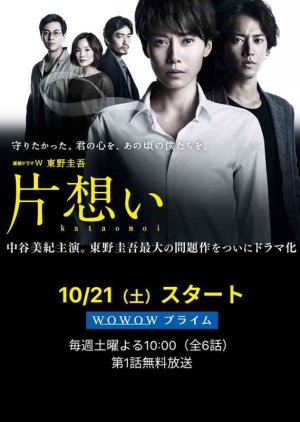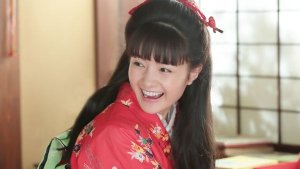 Nakatani Miki and Thilo Fechner Got Married
Nakatani Miki and Thilo Fechner Got Married - Français
- Español
- English
- magyar / magyar nyelv
- Titre original: 片想い
- Aussi connu sous le nom de: Unrequited Love , One-sided Love
- Réalisateur: Nagata Koto
- Scénariste: Yoshida Noriko
- Genres: Mystère, Psychologique, Drame
Distribution et équipes
- Nakatani Miki Rôle principal
- Kiritani Kenta Rôle principal
- Kuninaka RyokoNishiwaki RisakoRôle Secondaire
- Suzuki KosukeNakao KosukeRôle Secondaire
- Otani RyoheiHayata YukihiroRôle Secondaire
- Wada MasatoSugai MakotoRôle Secondaire
Critiques

One of the motifs is a Möbius strip, which technically has both one and two sides, which is also why I think the correct English translation of Kataomoi should be the more literal One-sided Love (I think the title is meant to have a double meaning). The story does have many "unrequited love" situations, but that's not the theme—it's about much more than that, about loving more wholly and unconditionally in spite of not understanding every side of the other.
STORY
While the story is based on a Higashino Keigo mystery novel (for those who don't know, he's one of Japan's most popular writers), the tone of this series is not that of a detective/crime/investigation drama (although there are elements of investigation), but rather, a thoughtful relationship-focused friendship drama with a cloudy murder mystery plot that weaves together those relationships. It's relatively slow-paced compared to another kind of genre you normally see mysteries filmed as, but it's extremely compelling and could really be marathoned in one go if you had the time!
It's rather artfully filmed at points, including the end sequence of the first episode, as someone mentioned. I almost feel this could have been a better feature film with a higher budget, but it's really well-made and was the perfect length for the story at six episodes.
As for all the hand-wringing about how they'd handle transgender identity issues, it's done in a sensitive and compassionate way without being maudlin or overkill like you might expect from Hollywood. Honestly, I wasn't surprised at that at all, but I did find it refreshing and insightful without being preachy or telling audience members how to think. While it's a huge part of the story and is discussed at length, it isn't The story. There is the mystery, but the story is ultimately about friendship, and each character is wrestling with many questions about relationships in their own way.
What some viewers may take more issue with is the ending, but in context I found it satisfying. It's certainly very Japanese in its embracing the ambiguity of many technically explosive moral situations, and recognizing sacrifice as part of love. Okay, I just made some sweeping generalizations there, and it may come off as a judgment/rationalization of those situations, but it's not, at all. I just wanted to mention these things, as I sometimes feel like certain elements of many J-dramas get a bad rap because they're seen through a different cultural lens...
CAST/ACTING
The casting is great, as all the team members featured in past and future are totally believable both at age 20 and in their mid-late 30s, even though some of the actors are pushing 40 or over. (Miki is even shockingly convincing as a high school-aged Mitsuki in one brief scene! And not just because her make-up artist was great!) The three main actors (the Nishiwaki 'couple' and Mitsuki) showed a huge range and a depth of emotion that gave me the sense they truly put their all into their characters. While Kuninaka Ryoko plays a role similar to others she's done [the emotionally complex wife who looks sweet but is tough], it's because she's so good at it. She plays off of both Kenta and Miki's characters wonderfully and somehow makes the weird tension (that isn't even what we'd think) actually believable.
REWATCH?
I'm not an avid rewatcher at all, especially when it comes to a story with a mystery plot, so normally I can't figure out a score for this! However, I think Kataomoi's rewatch value is high as you'd likely be able to better appreciate some of the great little symbolic touches, as well as the psychological aspects of what characters are going through at various times (that were initially more of a mystery). Most of all, probably Kenta's role as it's a subtle emotional character arc that only becomes more meaningful later in the story. On the other hand, this is a story that stays with you, so you'll probably still be thinking about it later and retroactively appreciate these things!
OST
Music was on-point as usual, with a great theme and emotive score. It almost never got sentimental or emotionally manipulative, but rather added complexity and mood. I feel like the end credits song has for sure been used before...if so, anyone remember what drama? I can't remember, but it's evocative and a perfect fit.
NOTE: For those wondering about the sex scene in the first episode, it isn't graphic/realistic but more atmospheric, is short, and serves a purpose. It's not jarring and you can see why it happens. But 'mature' is still a valid tag because the themes in this may not resonate for perhaps younger teens as the characters are nearing midlife and dealing with many of the emotional, relational, and identity issues of that age.
Cet avis était-il utile?

Mature, Serious, Complicated and Thought-Provoking
Disclaimer: I am not a transgender and do not know much about issues faced by transgenders and persons with gender dysphoria. I apologize in advance if I use incorrect or insensitive terms in my review. Please do kindly correct me respectfully in the comments if I make any mistake. Thank you.“Kataoimoi” aka “Unrequited Love” is definitely not a romance drama about unrequited love (though there are quite a few). At first glance, it’s about a murder and its investigation. But the main theme in this drama are issues faced by transgenders and those suffering from gender dysphoria. According to Mayo Clinic, gender dysphoria is the ‘feeling of discomfort or distress that might occur in people whose gender identity differs from their sex assigned at birth or sex-related physical characteristics.’
This drama opens my eyes to these topics and issues. I have a little bit knowledge of those suffering from gender dysphoria and might want to go through with a sex change procedure. However, this drama talks about more than just this procedure. I am particularly impressed with the analogy of the Mobius Strip. A character described that the inside and outside, male and female, co-exist on the same strip and not just one or another. Not everyone wants to have the procedure to change their sex surgically. There are some who want to identify with both genders and are comfortable with it.
It’s not an easy watch but a serious and complicated one. However, the writing and the execution could be better. A lot of information and details regarding the crime investigation and those involved are given to viewers in only 6 hour-long episodes. I have to pay close attention to the conversation and the details unveiled to figure out who’s who. I think this drama could benefit from a few more episodes, and explore some other relationships. Even with this criticism, I still find the drama to be quite slow-paced.
This is not a drama for everyone and you should know what you are getting yourself into. But it’s thought-provoking and I hope it sparks healthy conversation and the desire to learn more. Thanks to commenter @seroonetwothree, I learned of the term gender dysphoria and Googled about it.
Other Random Observations:
1. Excellent acting by the cast, especially Natatani Miki as Mizuki/Mitsuru.
2. I like the use of an American Football team as the backdrop. Quite unique for an Asian drama.
3. The pictures taken of Mitsuru are beautiful!
4. Love the ending song and it fits the drama well.
Ending my review with a quote from the drama: "Nature loves diversity. Society hates it.".
Completed: 10/16/2022
Cet avis était-il utile?

















































